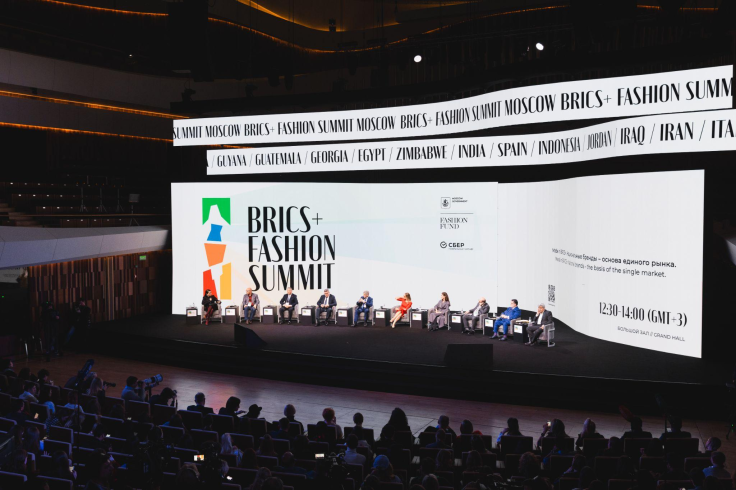BRICS Ushers in Expansion, Spotlighting a Green Future for Fashion
The BRICS alliance – comprising Brazil, Russia, India, China, and South Africa – is gearing up for expansion. On January 1, 2024, the United Arab Emirates, Saudi Arabia, Iran, Egypt, Ethiopia, and Argentina will officially become members of the BRICS family. In early December, over 60 nations converged at the BRICS+ Fashion Summit in Moscow, highlighting the green future of the fashion industry.

On the cusp of the critical UAE COP28 climate summit, fashion leaders within BRICS+ tackled the pressing challenges of sustainable development in textiles and clothing—an industry notorious for its high resource consumption and pollution. Yang Jian, Executive Chairman of the China Fashion Association, noted in his keynote address that China's focus on innovation and new positioning in developing its fashion brands reflects a move towards an innovation-driven technology industry, a culture-led fashion industry, and a responsibility-oriented green industry. Emphasizing the importance of product origin to Chinese consumers, Jian presented the development of guidelines for Chinese fashion brands with "green innovation" at their core.
Recent surveys indicate a shift in consumer attitudes in China, India, and Russia, where more than half are willing to pay premium prices for eco-conscious products. At the BRICS+ Fashion Summit, Russia introduced the Ecofuturum project, which demonstrates the country's dedication to textile material processing and reusing across various regions. In a bid to combat tonnes of textile waste, the country is installing modern textile collection points in urban areas, a move reflecting its commitment to sustainable urban living. Russia's national "Ecology" project, which also addresses textile waste, is being implemented successfully.
In line with its sustainability goals, Russia is fostering collaborations with international partners to modernize its textile recycling process. Talks with Chinese counterparts have centered around leveraging China's advanced technological equipment for the complete lifecycle of textile processing in Russia, showcasing a forward-thinking international approach to a global issue.
Turkey also figures prominently in Russia's expansion of its recycling capabilities. While specifics are yet to be released, the impending collaboration is built on shared environmental concerns and a mutual desire to address textile waste issues that go beyond national borders.
The initiation of these exchanges marks Russia's strategic entry into the principles of a circular economy, an economic system aimed at eliminating waste and promoting the continual use of resources. This unveiling is no surprise, as Russia had already set a course towards the circular economy model as early as 2021, with a strong focus on mitigating the adverse impact of industrial waste.
Globally, the fashion industry faces a tremendous challenge: 100-150 billion new items are produced each year, with up to 10% of unsold items ending up in landfills, according to the recent data. A panel discussion on green development, led by Sharma Aishwarya, a sustainability advisor for the Fort Fashion Council (UAE), stressed that the current culture of consumerism and excessive consumption must not be encouraged. Addressing the environmental burden this trend places on developing countries, panelists underscored the importance of supporting local brands and the slow fashion movement, a concept adopted throughout the Summit discussing producing as much as brands sell based on demand.
In the international fashion manufacturing industry, China, India, and Pakistan shine as the top triumvirate, churning out almost half of the world's apparel and accessories. Yet, this isn't without its own set of problems; their dominance comes wrapped in a bundle of sustainability issues primarily driven by contract manufacturing.
Harsh realities of low wages, underqualified workers, and various ecological considerations serve as glaring obstacles. These issues arose during the recent BRICS+ Fashion Summit, where industry stalwarts took to the stage to outline a path towards sustainability.
This ambition for change found a firm champion in Rajesh Masand, the head of India's leading association - the Clothing Manufacturing Association of India. He highlighted new initiatives like the SU.RE project, which aims to encourage a shift towards more ecologically conscious practices in fashion manufacturing. Funded by the United Nations, SU.RE is an embodiment of India's commitment to reshaping its fashion industry into a sustainable, green engine for growth.
Yet, what emerged as a recurring theme at the BRICS+ Fashion Summit was the call for support and upliftment of local brands—a strategy often touted as a weapon against environmental concerns. Several speakers and designers echoed this sentiment, including Adama Paris, the Senegal-based founder of Dakar Fashion Week. Renowned South African designer David Tlale, whose collections have found acclaim from New York to Paris and Moscow, emphatically advocated for the same approach.
Meanwhile, Alia Khan, founder of the Islamic Fashion and Design Council, and Olivia Merquior, creator of Brazil Immersive Fashion Week, joined the choir of voices emphasizing the focus on local talent. This potent message underlined a broader narrative—the fashion world must slow down and rethink, shifting its perspective towards sustainability and remembering the local artisans who weave its very tapestry.
Bringing together leaders from Africa, Asia, and Latin America, the BRICS+ Fashion Summit has proven an essential forum for developing countries. It has effectively demonstrated the potential for state cooperation at both economic and academic levels, with fashion as a basis for intergovernmental eco-agendas. Next year, as Russia takes the reins as chair of BRICS, the Summit is set to return to Moscow in 2024.
© Copyright IBTimes 2024. All rights reserved.





